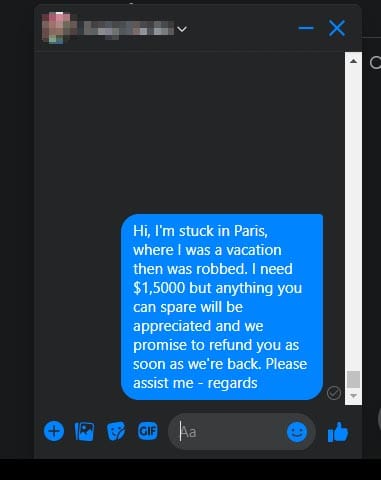It’s a scam! Be aware of friends asking for money over social media.
We all like to think that, if in a position to do so, we’d help out a friend in need. Whether that’s offering up a couch for the night, providing a shoulder to lean on or perhaps lending them a little money.
But what if our friend wasn’t our friend at all? What if it was someone merely pretending to be our friend as part of a scam?
While social media offers up many great ways to keep in contact, one of the drawbacks to keeping in touch through the Internet is that we can never be sure of the true identity of the people we’re speaking to. Just because a message we receive was sent from a friend’s social media account, how can we know that our friend’s account wasn’t compromised by cyber crooks through any number of online schemes that we discuss every week on this site?
It is this drawback that crooks often exploit for their financial gain, and one scam that has grown in popularity is the “friend in crisis” scheme.
Sponsored Content. Continued below...
The premise of the scam is simple. The crook pretends to be a friend of the victim. Perhaps the crook compromised that friend’s account, or maybe they created a duplicate account (known as a cloning scam.) Using the guise of the victim’s friend, the crook then contacts the victim.
What follows is known as the social engineering phase. This is the bait. The tall tale. The story spun by the crook to convince the victim into doing what the crooks wants them to do. It’s also the part of the scam that can vary depending on the specific scammer “doing the talking”, so to speak.
The “friend stuck abroad” is one popular permutation of this scheme. The crook claims they are stuck abroad after having their money stolen, and urgently need money to get back home. Alternatively crooks may use the “payday loan” variant where they claim to urgently need to pay back a short term loan but do not get paid until the next day.
Whatever the yarn, they all have one important attribute in common. They all want you to reach into your wallet and send money over the Internet. Quickly.

The “stuck abroad” Facebook fake friend scam.
But before you cough up the dough, it’s important that you do your due diligence first, and go through these quick steps to make sure you’re not making an Internet scammer richer.
Sponsored Content. Continued below...
Firstly, always remember that just because a message was sent from a friend’s social media account, it doesn’t mean it was them. Does the message seem suspicious or out of character? Does it contain spelling or grammar errors?
Secondly, be sceptical of messages that ask you to send money through the Internet, especially if the money if requested using services like Western Union, and doubly especially if there is an emphasis placed on urgency.
Thirdly, and most importantly, the catch-all advice is to contact your friend outside of social media to ensure the request is genuine. This can be through a phone call, a video chat or even meeting in person.
These scams have been especially popular amid the pandemic when we can’t always see our friends and family face to face, so be especially cautious around this time, and remember that following the simple advice above will mean you won’t get caught out by a fake friend.
Continued below...
Thanks for reading, we hope this article helped, but before you leave us for greener pastures, please help us out.
We're hoping to be totally ad-free by 2025 - after all, no one likes online adverts, and all they do is get in the way and slow everything down. But of course we still have fees and costs to pay, so please, please consider becoming a Facebook supporter! It costs only 0.99p (~$1.30) a month (you can stop at any time) and ensures we can still keep posting Cybersecurity themed content to help keep our communities safe and scam-free. You can subscribe here
Remember, we're active on social media - so follow us on Facebook, Bluesky, Instagram and X
